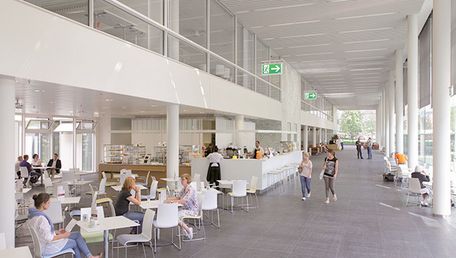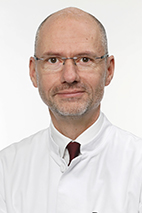Department of Anaesthesiology
Key treatment areas
- Preoperative management
- Anaesthesia in high risk patients
- Pain therapy after major surgery
- Critical care medicine
- Emergency medical care
- Out-patient pain clinic
Key research areas
- Anaesthesia and organ protectionIntensive care medicine
- Intestinal oxygen supply and microcirculation
- Molecular mechanisms of cardioprotection and innate immunity
- Pathophysiology of the lung
- Pathophysiology of nociception
- Pathophysiology of peripheral nerves
Patient care
The department of anaesthesiology with 130 clinical and non-clinical staff represents one of the major clinical disciplines in the University Hospital of Dusseldorf. In addition to anaesthesia, our department covers also intensive care medicine, emergency medicine and an out-patient clinic for chronic pain therapy. The department of anaesthesia undertakes over 18.000 procedures per year in all surgical departments and diagnostic facilities. Our interdisciplinary out-patient pain clinic treats approximately 500 patients per year.
The role of an anaesthetist is to provide anaesthesia and analgesia for patients undergoing surgery or painful procedures. The anaesthetist determines the appropriate method of anaesthesia for a patient by the following criteria: a physical examination, an evaluation of the patient’s clinical results and a risk assessment profile. In addition, it is the anaesthetist’s duty to provide preoperative care which includes for e.g. addressing the anxieties or fears of a patient and to pre-medicate the patient in preparation for surgery.
During an operation, after the administration of anaesthesia (general, regional or local) and/or analgesia, the patient enters a state of carefully controlled unconsciousness and all his/her body functions are constantly monitored by the anaesthetist. After an operation (post-operative period), the anaesthetist monitors the patients condition in a recovery unit, until they can be transferred to a ward.
In the case of major surgery, it is often necessary for the patient to be transferred to the intensive care unit, so that he/she can be closely monitored. Currently, we have a 40 bed intensive care unit run under the supervision of the department of anaesthesia.
We are a team of highly specialised doctors and nurses, dedicated to providing a comprehensive anaesthesia and analgesia service with optimum clinical care.
Teaching
Anaesthesia, like other medical disciplines is an integral part of the curriculum for medical students. The department of anaesthesia prides itself on providing a high standard of teaching for trainee doctors and medical students. The results of which were reflected in the recent medical exams, anaesthesia was ranked first by the Medical Faculty. In addition, the Medical School of Dusseldorf was highly ranked for anaesthesia in the national league table for German Medical Schools. We are committed to providing our medical students with an excellent educational experience and the use of the latest medical technology. Our department provides a patient simulator (“patient who forgives everything”) for students to test and improve their practical and clinical skills, preparing them for real life clinical scenarios.
Research
The department of anaesthesia consists of eight clinical and experimental research groups, funded by external and internal research bodies. In the last year, we have excelled producing several high ranking scientific publications. Our research covers the fields of anaesthesiology, cardiovascular and intensive care medicine with the vision to transfer basic research to clinical practice.
Education and training
Twice a week advanced educational lectures are presented on anaesthesia, intensive care medicine and emergency medicine. Our department is organising every month a conference covering the field and treatment of chronic pain. All of our lectures are evaluated and certified by the regional medical board ‘Ärztekammer Nordrhein’. Our ‘full scale’ patient-simulator also enables our clinicians and trainee doctors to improve and advance their skills in realistic emergency scenarios. Through regular practical and theoretical training, our medical staffs maintain high standards, and hence, ensuring the safety of our patients.
More information
Visit this site under: www.uniklinik-duesseldorf.de/
anaesthesiologie





